MSW TO RDF SRF BRIQUETTE PLANT FOR SALE
Turn Municipal Waste ( MSW) Into Solid Recovered Fuel (SRF) And Refuse Derived Fuel Briquettes.
More Environmentally Friendly Waste Disposal Methods Than Landfills.
MSW TO RDF BRIQUETTE PLANT ENERGY SYSTEM
Refused derived fuel ( RDF ) technology refers to the process of crushing, sorting, magnetic separation, re-crushing, drying, briquetting, and processing the combustible waste into solid recovered fuel ( SRF ) briquettes. The application of RDF technology reduces environmental pollution greatly. It is a safe treatment for city waste.
A SYSTEM TURNING CITY WASTE TO ENERGY FUEL - MSW TO RDF BRIQUETTE PLANT
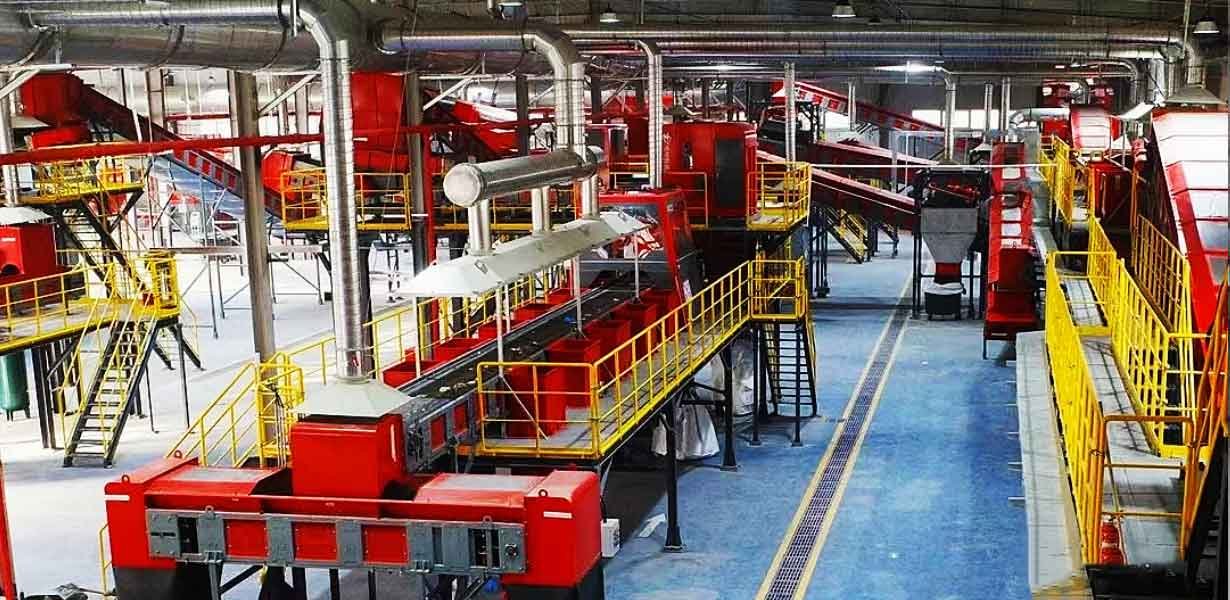
WHAT IS A MSW TO RDF BRIQUETTE SYSTEM
The RDF briquette production line is a professionally designed briquetting system for transferring Municipal waste into RDF fuel briquettes. It can be fed to the industrial boiler or power plant instead of coal. It is also an alternative to traditional fossil fuels such as natural gas and diesel. The final RDF briquettes product produced by the briquette making machine is mostly and widely applied in many industrial heating industries. As the MSW and Industrial waste composition vary much, all plants are designed based on actual raw material composition and condition. The configuration is designed based on your local environmental policy.

RDF RAW MATERIAL AND PRE-TREATMENT
Municipal refuse includes waste paper, plastic, textiles, sludge, rubber, and some other kinds of material. The MSW briquetting machine is used very widely. The cardboard briquette machine, waste plastic briquette machine, and waste paper briquette machine are applied more in these projects. According to the composition of city waste, we developed modular designs. It is suitable for municipal waste with a complex composite. The fuel quality can be improved by configuring shredders, screening machines, density air separators, magnetic separators, eddy current separators, and other equipment.
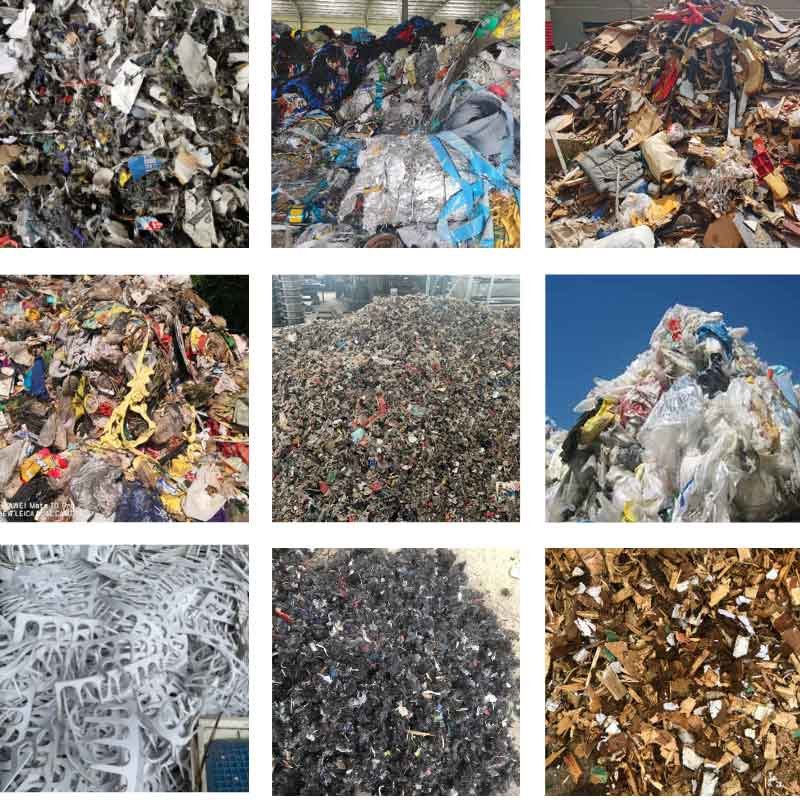
PROCESS FLOW OF RDF BRIQUETTING PLANT
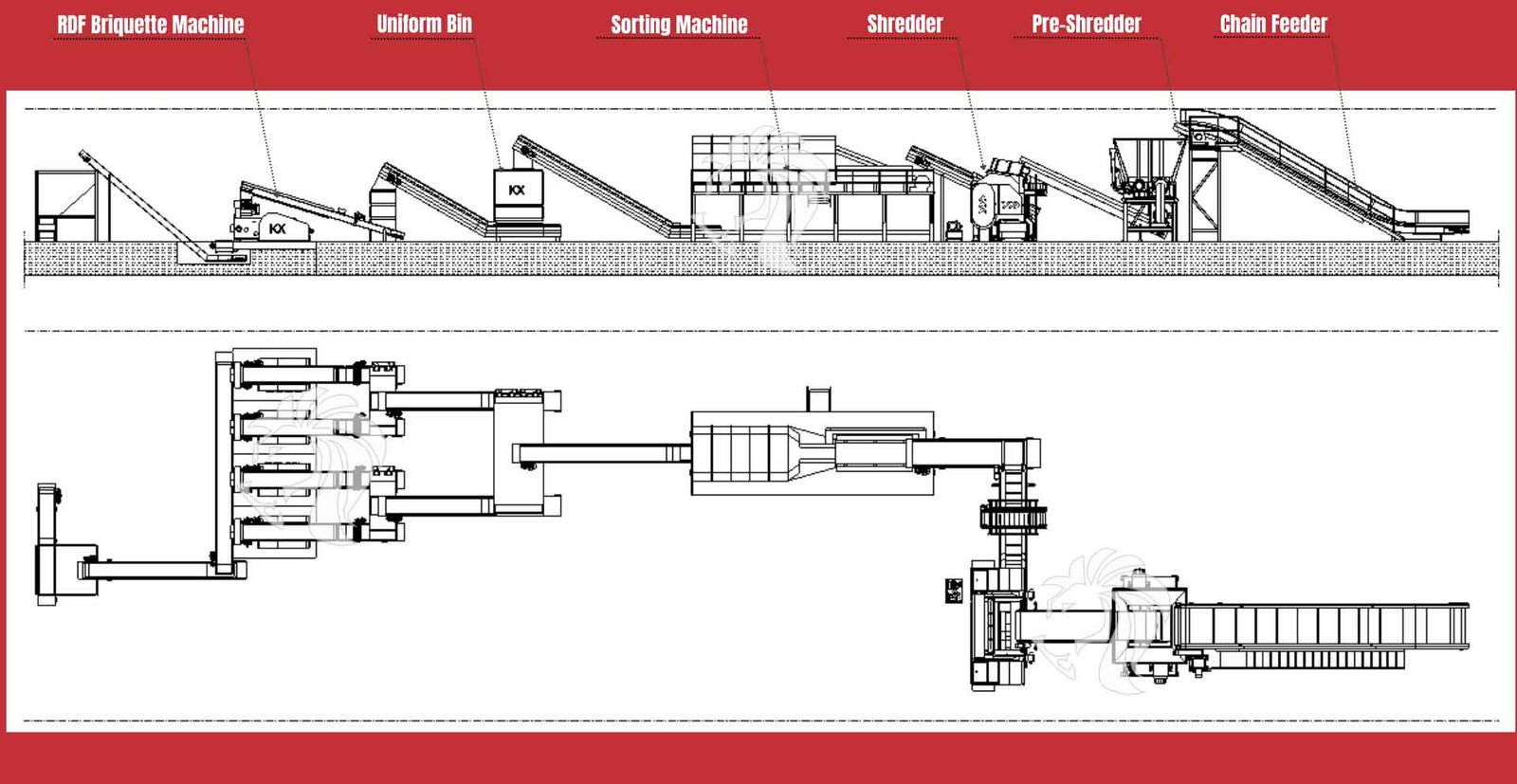
HOW TO MAKE RDF BRIQUETTES FROM CITY WASTE
Pre-shredder-Shred waste to a size below 80mm
Magnetic Separator-The conveyors are equipped with special customized magnetic separators.
Rotary Screener, Air Separator-Separate combustibles waste by size and density.
Shredder-Shred waste to a size below 40-60mm.
Buffer Bin-The material is conveyed to the buffer Bin after sorting and shredding. The speed is adjusted against the briquetting machine automatically.
Briquette Press – 50% energy saving, fast punch, high output, and the molding is less affected by moisture content.
Conveying System-The whole line is sealed under a pulse dust removal system, which is efficient and reliable for dust removal and improves the operating environment.
Intelligent Control System – All controls under the PLC touch screen.
Safety-The shredder and dust collector is equipped with a spark detection system, which actively detects the spark during the shredding process and eliminates fire hazards.
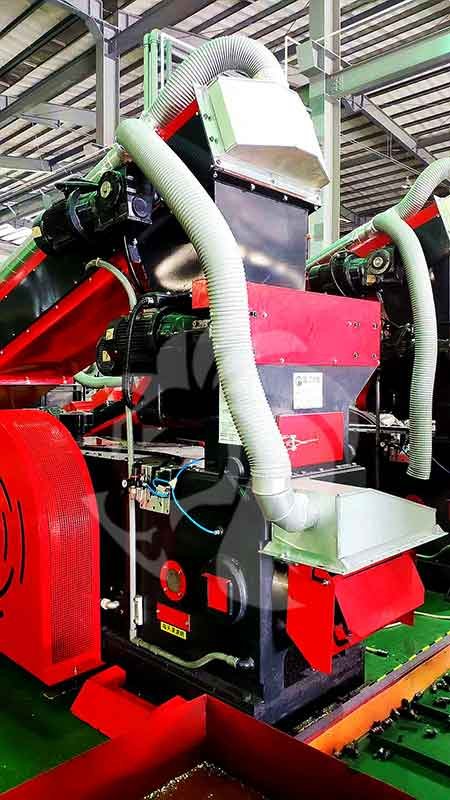
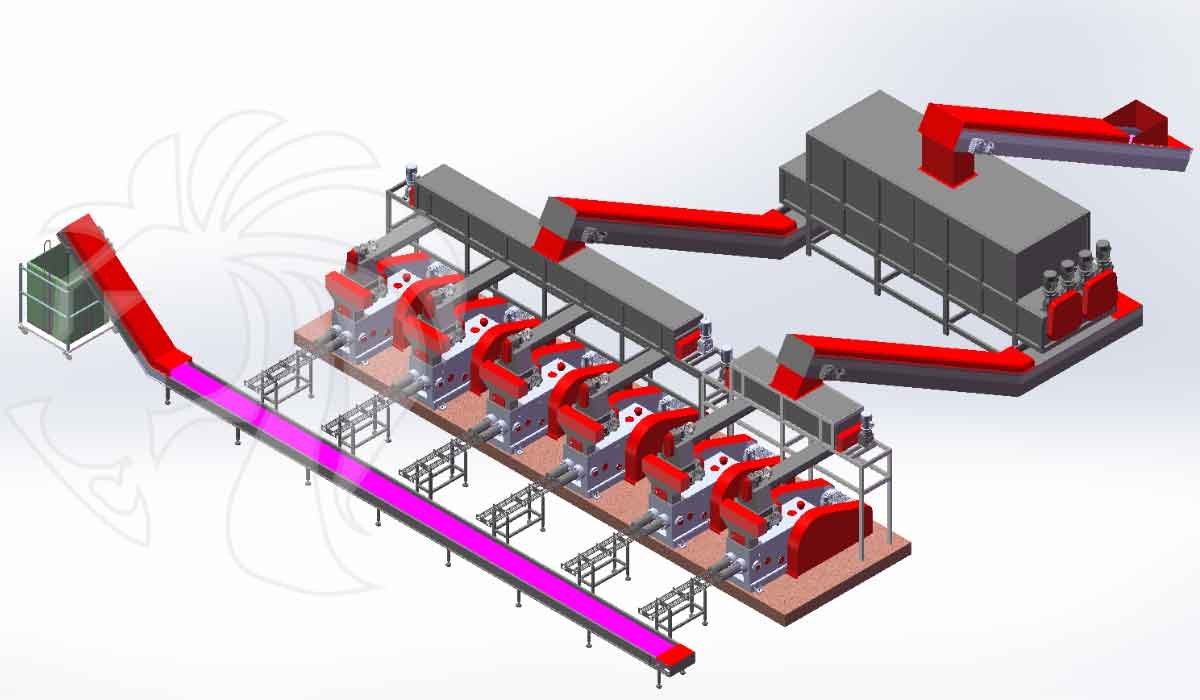
MSW BRIQUETTE PLANT UNIQUE ADVANTAGE
- Customized plant based on actual raw material condition and project plan.
- Provide 24 hours online pre-sale and after-sale service
- Full automatic PLC control system and more energy-saving 50%.
- Design new spare parts and sharply decrease the maintenance time by 60%.
- 24 hours continuous working designed
- New feeding structure to meet a variety of raw material applications.
- A new and better solution in MSW treatment field.
BRIQUETTES PARAMETERS
The diameter of the RDF briquettes is generally between 30 mm and 60 mm, and different diameters can be customized according to your materials.
| Briquette density | adjustable from 0.8-1.2g/cm3 |
| Briquette size | 20mm-30mm customized. |
| Specified length | customized. |
CHOOSE BEST RDF BRIQUETTE MAKING MACHINE
- Fully automatic PLC control, stable operation
- High output, all-in-one Briquette machine, can produce 20mm-110mm diameter briquette just by one machine
- 24 hours of continuous production without failure
- Split-type mold design, low maintenance cost
- Press rate adjustable, the briquette density is easy to change
- Labor cost-saving
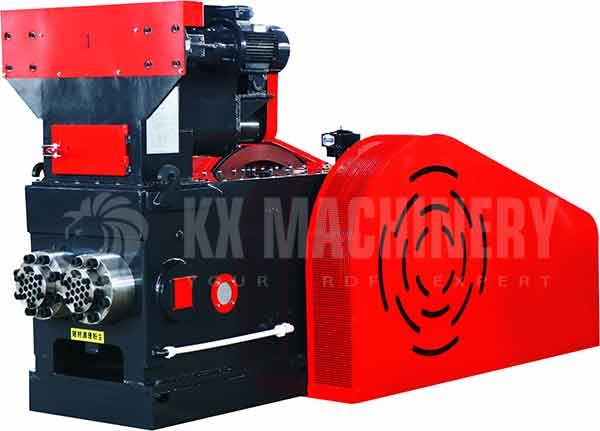
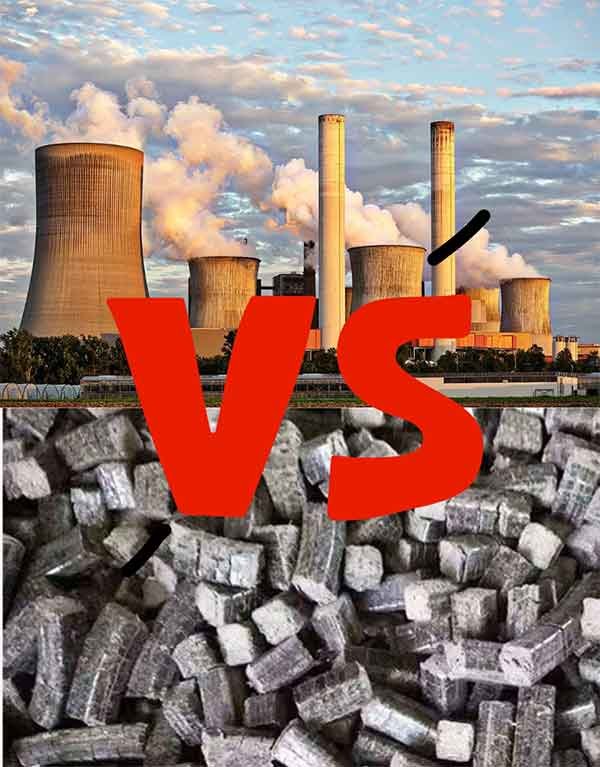
TRADITIONAL FOSSIL FUEL VS ALTERNATIVE FUEL SRF/RDF BRIQUETTES
One ton of refuse-derived fuel can replace 715 kg of coal, 590 kg of petroleum coke, and 500 kg of oil fuel. In China, RDF/SRF briquettes have been used in high fuel demand industries such as power plants, gasification power generation, and cement plants for a long time. Against the background global energy shortage, promoting the development of RDF briquettes can alleviate the dependence on traditional fossil fuels. It is of great significance to reducing carbon dioxide and protecting our environment.
HIGH CALORIFIC VALUE OF THE RDF BRIQUETTES
The calorific value of RDF briquette from city waste depends on its raw materials composition. If it contains more plastic, paper, and textiles, the calorific value can reach more than 4,000 kcal. The RDF briquettes from industrial waste with relatively high-quality components can up to 5,000 kcal.
PROVIDE THE MOST ADVANCED RDF MACHINE
MSW and Industrial waste briquetting to RDF briquettes is a brand-new application in the domestic waste and industrial waste recycling industry. As the first factory to try to develop this equipment, we have accumulated extremely rich experience. Welcome to contact us for more details.
FREQUENTLY ASKED QUESTIONS
1.What‘s the city waste size prepared for the SRF briquette machine?
For soft materials such as waste paper and waste plastic, the size can be no more than 40-50 mm. For hard plastic, rubber, and wood, the size generally needs to be no more than 10-20 mm. The exact size needs to be determined according to the actual condition.
2.Do you have a waste plastic briquetting machine, waste paper briquetting machine, or plastic briquetting machine?
Yes, our company manufactures waste plastic briquette presses, waste paper briquette presses, industrial waste briquette presses, etc. The machine can compress a mixture of these materials, or only each of them, such as Waste paper, plastic, cloth, etc.
3.The moisture content of city waste is very high. How do reduce the moisture content?
Except for drying naturally, there are two economical methods for drying. One is drying with waste heat, the other is biological fermentation, and the second method is a new method that has just emerged.
4.Can the landfilled MSW waste be pressed to briquettes?
Yes. In some countries, due to the environmental pollution caused by landfills, it needs to be excavated for reprocessing. We’re glad to tell you that we already have experience in these projects. Welcome to contact us.
CONTACT US NOW
We are professional RDF briquette machine factory and manufacturer. Our engineers are glad to talk with you more details.
- The best design & quality machines
- Quick reply within 2 hours
- Provide the best proposal within 72 hours.
- Free test run service for special raw materials
- Detailed case analysis, make you knowbriquette machines soonest.

